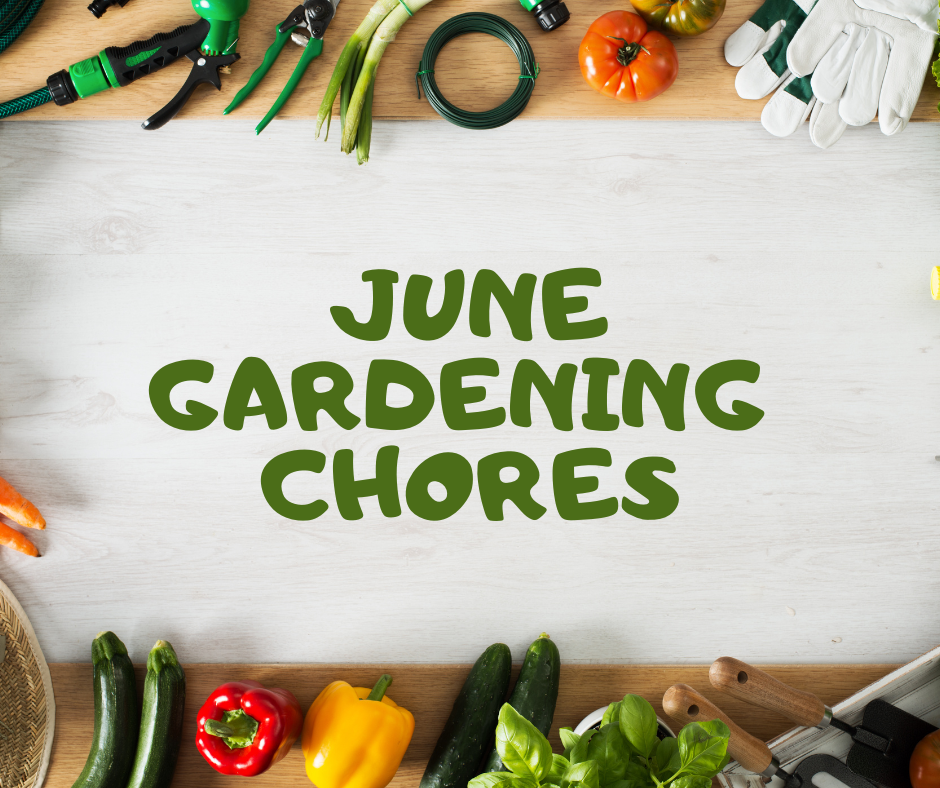June Garden Chores
go.ncsu.edu/readext?1074948
en Español / em Português
El inglés es el idioma de control de esta página. En la medida en que haya algún conflicto entre la traducción al inglés y la traducción, el inglés prevalece.
Al hacer clic en el enlace de traducción se activa un servicio de traducción gratuito para convertir la página al español. Al igual que con cualquier traducción por Internet, la conversión no es sensible al contexto y puede que no traduzca el texto en su significado original. NC State Extension no garantiza la exactitud del texto traducido. Por favor, tenga en cuenta que algunas aplicaciones y/o servicios pueden no funcionar como se espera cuando se traducen.
Português
Inglês é o idioma de controle desta página. Na medida que haja algum conflito entre o texto original em Inglês e a tradução, o Inglês prevalece.
Ao clicar no link de tradução, um serviço gratuito de tradução será ativado para converter a página para o Português. Como em qualquer tradução pela internet, a conversão não é sensivel ao contexto e pode não ocorrer a tradução para o significado orginal. O serviço de Extensão da Carolina do Norte (NC State Extension) não garante a exatidão do texto traduzido. Por favor, observe que algumas funções ou serviços podem não funcionar como esperado após a tradução.
English
English is the controlling language of this page. To the extent there is any conflict between the English text and the translation, English controls.
Clicking on the translation link activates a free translation service to convert the page to Spanish. As with any Internet translation, the conversion is not context-sensitive and may not translate the text to its original meaning. NC State Extension does not guarantee the accuracy of the translated text. Please note that some applications and/or services may not function as expected when translated.
Collapse ▲ BY: ELEANOR MOYER, CLAY COUNTY MASTER GARDENER VOLUNTEER
BY: ELEANOR MOYER, CLAY COUNTY MASTER GARDENER VOLUNTEER
Usually it’s time to encourage purchasing a rain barrel. Difficult as it may seem right
now, July, August, and September will bring drier weather.
- Weed and weed some more! Keeping up will deter seeds from forming.
- Mulch
- Try rooting cuttings of deciduous shrubs. Place a 6-inch clipping in damp soil. Keep the soil moist and roots may form by September planting time.
- Use cuttings of mint and lemon balm as a mulch around veggies to deter insects.
- Fertilize tomato plants regularly. Inspect almost daily for disease and insect damage. Remove and discard infected leaves. Use a fungicide if necessary following directions.
- Harvest vegetables regularly to enjoy peak yumminess and to encourage continued fruiting. Leaving vegetables too long will produce an unusable product and stop the plant from creating new, tender fruit.
- Hand-pick Japanese beetles by tapping the infected flower to dislodge them into a bowl of soapy water.
- Use newspaper in the garden covered with pine or wheat straw to prevent weeds.
- Harvest onions, garlic and Irish potatoes when two thirds of the plant tops have died down.
- Keep cucumbers watered regularly (so far, not a problem) so they won’t have a bitter taste.
- Blue Hubbard squash is a trap crop to attract insects away from other squash and cucumbers.
- It’s not too late to plant seeds of cosmos cleome, marigold and zinnia.
- Divide iris to prevent overcrowding discarding damaged rhizomes.
- Remove faded flowers from summer annuals for a continuous bloom cycle.
- Stake tall flowers like lilies, dahlias, and holy hocks.
- Cut back chrysanthemums so they won’t be too leggy later in the summer and fall when they bloom.
- Prune climbing roses after they bloom.
- Summer blooming bulbs can still be planted.
Visit the Master Gardener Discovery Garden at 25 Riverside Circle, to see how our garden grows! The website contains valuable information including a gardener plant toolbox with detailed descriptions and photographs of 4,657 plants to grow in and around North Carolina: clay.ces.ncsu.edu



